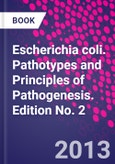The 2e of Escherichia coli is a unique, comprehensive analysis of the biology and molecular mechanisms that enable this ubiquitous organism to thrive. Leading investigators in the field discuss the molecular basis of E. coli pathogenesis followed by chapters on genomics and evolution. Detailed descriptions of distinct strains reveal the molecular pathogenesis of each and the causes of intestinal and extra-intestinal infections in humans. This work concludes with a presentation of virulence factors common to two or more pathotypes. The book is a great resource for references and up-to-date knowledge for anyone who studies E. coli pathogenesis, either as established investigators or investigators new to the field. It is also an excellent text for those who teach mechanisms of pathogenesis to graduate students and medical students and wish to have a source of knowledge from which to develop lectures.
Please Note: This is an On Demand product, delivery may take up to 11 working days after payment has been received.
Table of Contents
Section I: Escherichia coli, the OrganismThe Biology and Ecology of Pathogenic E. coli
Comparative Genomics of Pathogenic E. coli
Evolution of Pathogenic E. coli
Section II: Escherichai coli Pathotypes
Enteropathogenic E. coli
Enterohemorrhagic and other Shiga-toxin Producing E. coli
Enterotoxigenic E. coli
Shigella and Enteroinvasive E. coli
Enteroaggregative E. coli
Uropathogenic E. coli
Meningitis-Associated E. coli
Hybrid and Potentially Pathogenic E. coli strains
Section III: Escherichia coli Virulence Factors
Adhesive Pili of the Chaperone-Usher Family
Type IV Pili and Type 2 Secretion Systems
Type 3 Secretion Systems
Type 3 Secretion Effectors
Types 1 and 5 Secretion Systems and Toxins
Capsule and Lipopolysaccharide
Authors
Michael Donnenberg University of Maryland School of Medicine, Baltimore, U.S.A..Michael Donnenberg, MD is a Professor of Medicine and of Microbiology and Immunology at the University of Maryland. Dr. Donnenberg is a graduate of the Columbia University College of Physicians and Surgeons. He completed residency in Internal Medicine at what is now the Bayview Campus of Johns Hopkins and fellowship in Infectious Diseases at Tufts/New England Medical Center. After additional postdoctoral research training at the Center for Vaccine Development at the University of Maryland, Dr. Donnenberg joined the faculty in 1990.
Dr. Donnenberg's research has focused on the molecular pathogenesis of infections due to Escherichia coli and on the biogenesis and function of bacterial surface appendages called Type IV Pili that are used by many pathogens to adhere to host cell surfaces. His work has been continuously funded by the National Institutes of Health for over twenty years and has resulted in the publication of over one hundred original manuscripts, reviews, and book chapters. He is a Fellow of the Infectious Diseases Society of America and the American Academy of Microbiology and a member of the American Society for Clinical Investigation. He is a recipient of the Oswald Avery Award from the Infectious Diseases Society of America.
Dr. Donnenberg is an active Infectious Diseases clinician and directs the Medical Scientist (MD/PhD) Program at the University of Maryland. He is also active in medical education and was an inaugural member of the Pass and Susel Academy of Academic Excellence at the University of Maryland.








